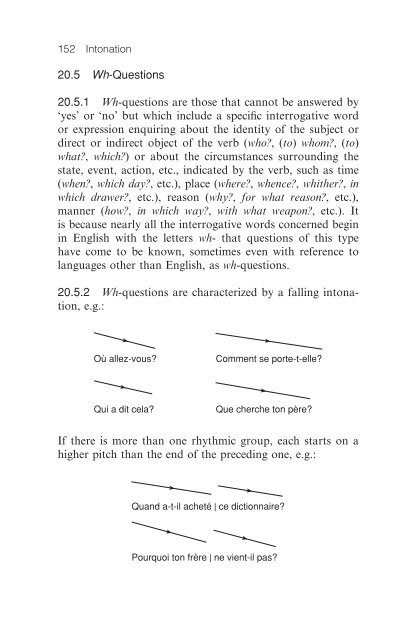An Introduction to French Pronunciation
An Introduction to French Pronunciation
An Introduction to French Pronunciation
Create successful ePaper yourself
Turn your PDF publications into a flip-book with our unique Google optimized e-Paper software.
152 In<strong>to</strong>nation<br />
20.5 Wh-Questions<br />
20.5.1 Wh-questions are those that cannot be answered by<br />
‘yes’ or ‘no’ but which include a specific interrogative word<br />
or expression enquiring about the identity of the subject or<br />
direct or indirect object of the verb (who?, (<strong>to</strong>) whom?, (<strong>to</strong>)<br />
what?, which?) or about the circumstances surrounding the<br />
state, event, action, etc., indicated by the verb, such as time<br />
(when?, which day?, etc.), place (where?, whence?, whither?, in<br />
which drawer?, etc.), reason (why?, for what reason?, etc.),<br />
manner (how?, in which way?, with what weapon?, etc.). It<br />
is because nearly all the interrogative words concerned begin<br />
in English with the letters wh- that questions of this type<br />
have come <strong>to</strong> be known, sometimes even with reference <strong>to</strong><br />
languages other than English, as wh-questions.<br />
20.5.2 Wh-questions are characterized by a falling in<strong>to</strong>nation,<br />
e.g.:<br />
Où allez-vous?<br />
Qui a dit cela?<br />
Comment se porte-t-elle?<br />
Que cherche <strong>to</strong>n père?<br />
If there is more than one rhythmic group, each starts on a<br />
higher pitch than the end of the preceding one, e.g.:<br />
Quand a-t-il acheté | ce dictionnaire?<br />
Pourquoi <strong>to</strong>n frère | ne vient-il pas?












